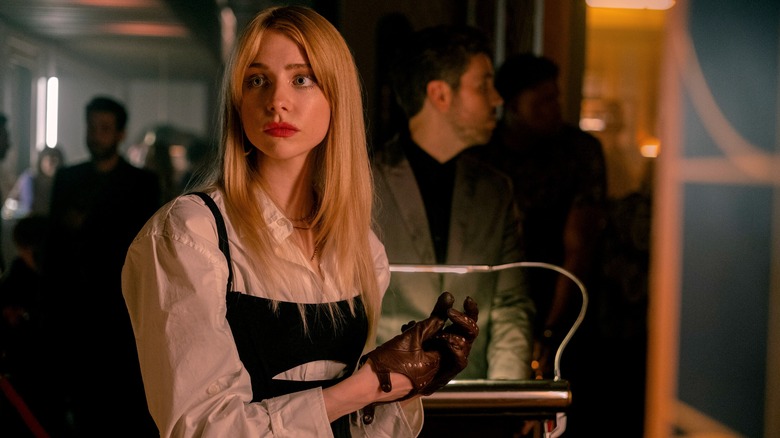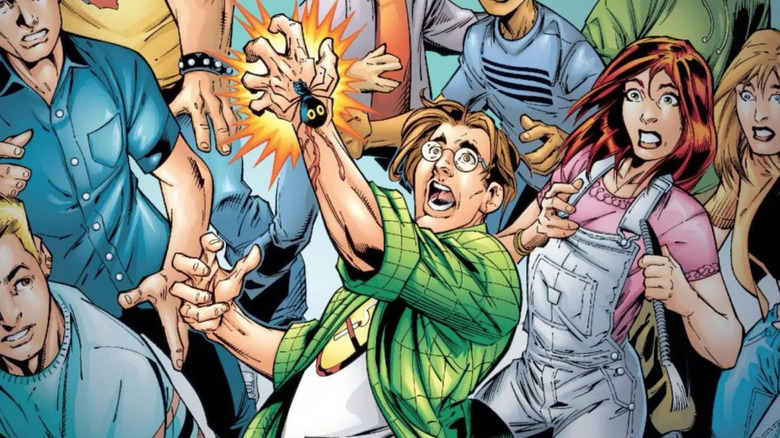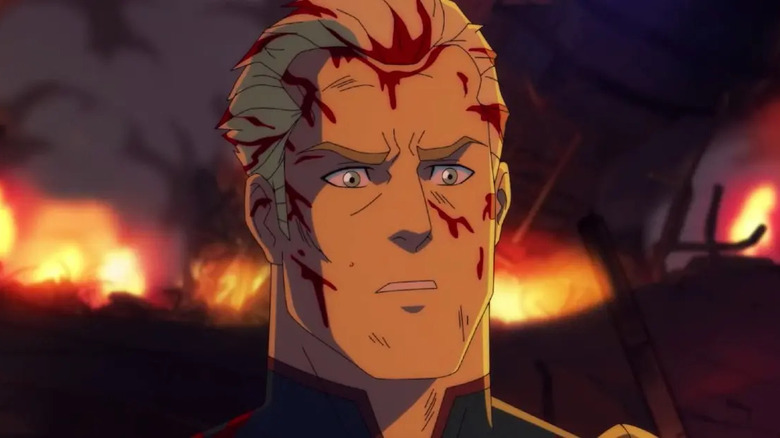Gen V Reminds Us That Every Single Superhero Backstory Is A Tragedy
This post contains spoilers for "Gen V."
Part of what separates "Gen V" from its parent show "The Boys" is the perspective that the story is told from. In "The Boys," the superheroes (aka "supes") are the villains. Key to the show's satire of the superhero genre is showing the collateral damage of normal people being casually crushed by the supes' carelessness with their powers. The main characters are all people who've got a bitter taste of that and want some payback.
In "Gen V," though, the leads are all supes — not that the show makes these "heroes" look much better than "The Boys" does. One trope the show has been showing as especially unenviable is the origin story: how a superhero gets their powers, secret identity, etc.
The series opened with the bloodbath of Marie's (Jaz Sinclair) origin story; she couldn't control her blood-bending powers at their onset and accidentally killed her parents. We've also heard how the telepathic Cate (Maddie Phillips) learned about her powers; during a family camping trip, she angrily told her little brother to leave and never come back. "Pushed" by her powers, he obeyed and wandered off, never to be seen again. In the latest episode, "Jumanji," the others enter Cate's mind and see firsthand how this traumatic event destroyed Cate's relationship with her parents.
I've compared Cate to Rogue from "X-Men" before (mostly because of the way she wears gloves to inhibit her powers). Their origins are also similar. Rogue's mutant "gift" is to steal others' vitality; a touch from her can be lethal. She discovered this when she kissed her first boyfriend and put him in a coma, as seen in both the comics and the first "X-Men" film.
If you peel back the layers, plenty of superhero origin stories are disturbing. In fact, some of them could just as easily be horror stories.
Superhero origins
For many superheroes, their powers come with loss. Take Superman — he lives on Earth, but he's the Last Son of Krypton. Kal-El never got to meet his birth parents or grow up on his homeworld. In the comic mini-series "Superman: Birthright" (by Mark Waid, Leinil Francis Yu, and Gerry Alanguilan) showing Superman's early days as a hero, he initially doesn't know what happened to his planet. Once his nemesis Lex Luthor discovers the awful truth, he takes great delight in revealing it to Superman.
Batman's origin is smaller in scale, but more personal. The death of Bruce Wayne's parents has become a punchline these days because of how many times it's been depicted on film. Even so, an eight-year-old boy seeing his parents gunned down in front of him? Strip away the superhero origin story element and you'll realize how truly traumatizing that would be.
If DC Comics are epic myths, Marvel's are sci-fi stories — with hero origins right out of monster movies. The Incredible Hulk was created when Dr. Bruce Banner was caught in the blast of a "gamma bomb." The Hulk, with his raw strength and untempered rage, personifies the destructive power of atomic weapons. Daredevil, likewise, lost his sight after being hit by a chemical truck, while Wolverine was subjected to tortuous scientific experiments (much like Sam in "Gen V"). For all these heroes, their powers are reminders of their suffering.
Spider-Man splits the difference — Peter Parker got his powers from a radioactive spider bite (in another world, that transformation could've been much more horrifying). Then Peter lost his Uncle Ben when he was killed by a burglar whom Peter had failed to stop. The scene in "Spider-Man 2" where Peter (Tobey Maguire) confesses the truth of Ben's death to his Aunt May (Rosemary Harris) has emotion and tragedy to rival a human-scale drama.
Supervillain origins
The other side of the superhero coin is the villains, and their backstories can be plenty tragic too. It's an easy way to add depth to villains while still having them make the wrong choices in the present. "Batman: The Animated Series" reinvented C-List villain Mr. Freeze by giving him such an origin. In "Heart of Ice," Victor Fries was a cryogenics scientist trying to save his wife from a terminal illness with suspended animation. Interference from Fries' greedy boss pulled the plug on the effort and left Fries confined to sub-zero temperatures. With his heart frozen cold, he lives only for vengeance.
The series would repeat this in "Feat of Clay" with Clayface/Matt Hagen, an actor left with facial injuries after a car accident, who risks it all on an experimental skin cream. Transformed into a monster, Hagen's only goal is to return to normal — though his bullish personality means he never lets Batman help.
There are too many other examples to list, so let's circle back to "The Boys" with the worst of the worst, Homelander (Antony Starr). It seems hard to believe, but this vicious, self-loathing psychopath was once, according to "The Boys Presents: Diabolical" episode "One Plus One Equals Two," an earnest aspiring hero. At his public debut, he was asked why he wanted to be a superhero. He gives a rehearsed speech about his non-existence experiences playing baseball as a kid. Meanwhile, the scene cross-cuts to his real origin: raised in a sterile lab and abused over and over to gauge how much punishment he could take.
Add in no impulse control, no training, and freedom from any consequences, and Homelander becomes a monster. The hope in "Gen V" is that these kids don't end up the same way.
"Gen V" is streaming on Prime Video, with new episodes every Friday.


